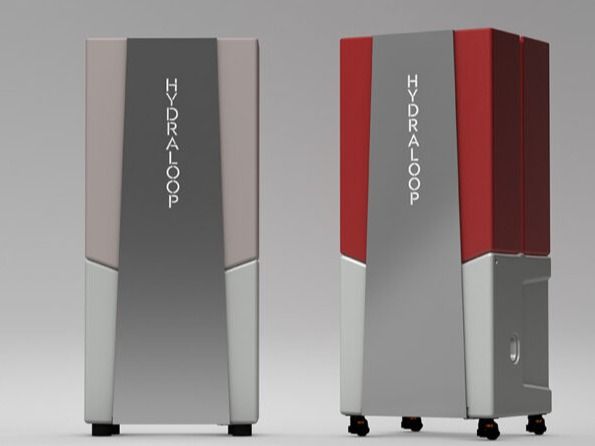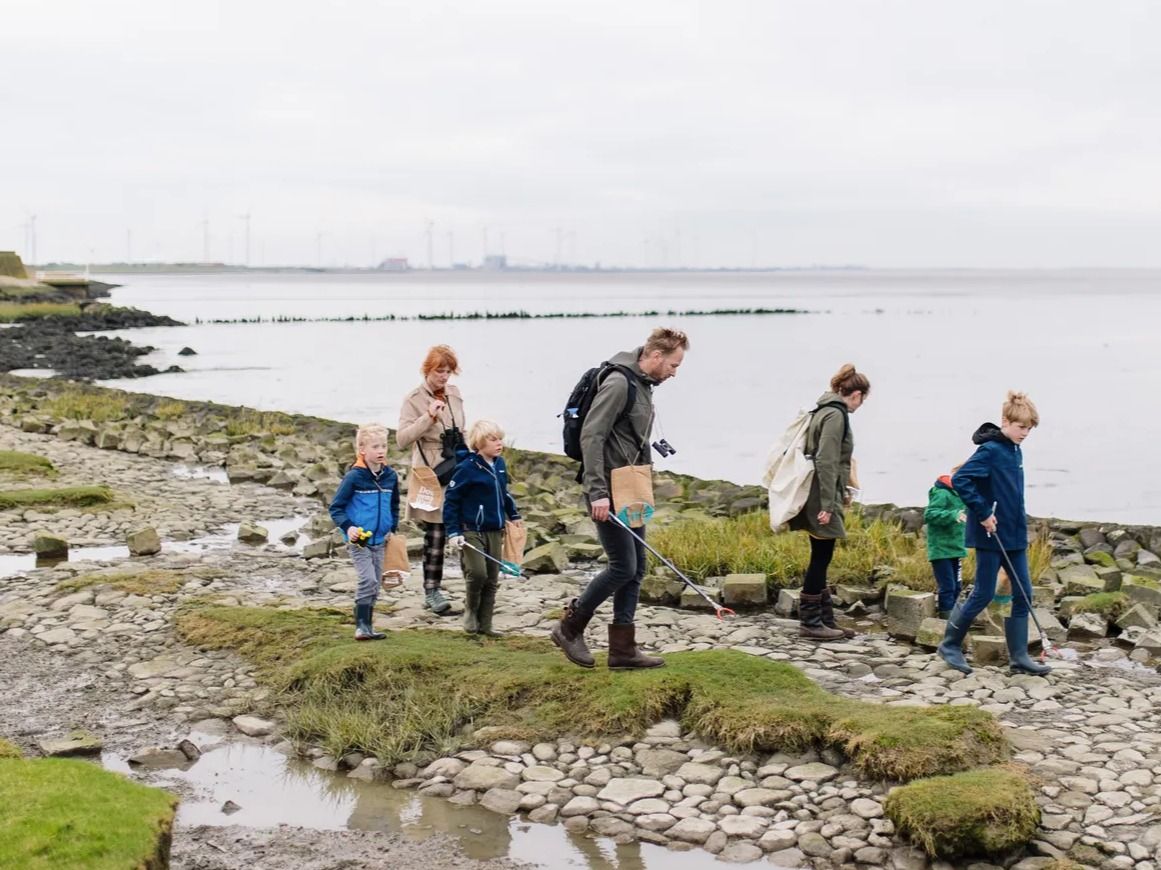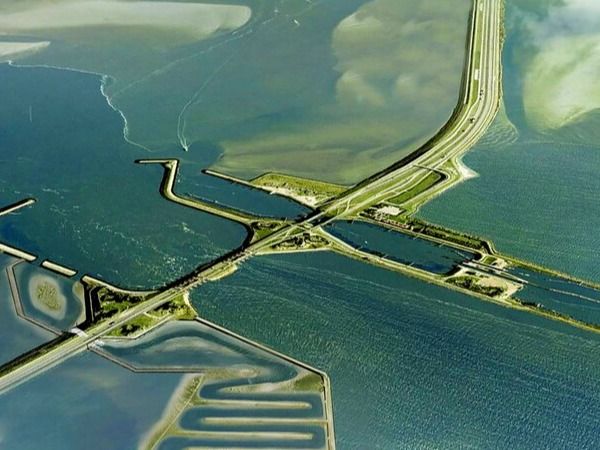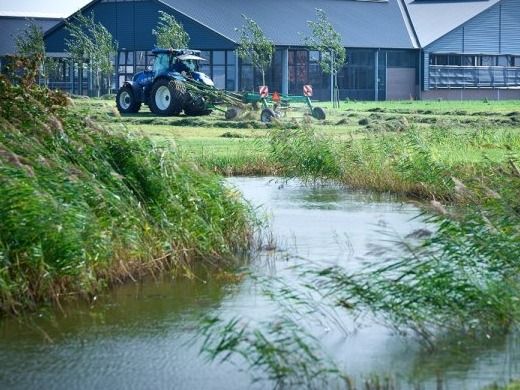Circular clusters
Friesland focuses on these economic sectors because of the regional (economic) importance, the potential circular impact for these sectors and the solutions they offer (inter)nationally. Friesland aims to form clusters of these specific sectors, by adapting the triple-helix approach and building integrated regional programs on these sectors. This provides the sector with clear ambitions, goals and actions. Moreover, such a profile helps in communication, fostering cooperation, and attracting financial options to scale up. These sectors include:
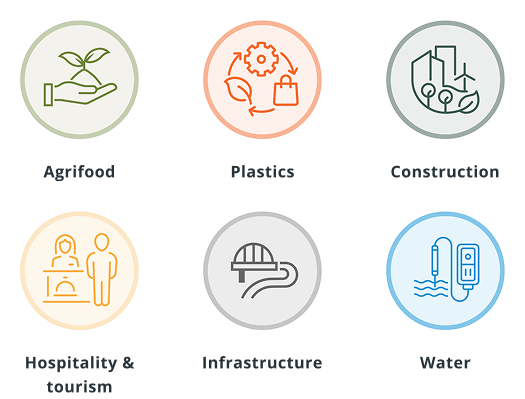
Construction¶
Conventional building materials such as cement, steel, and bricks are associated with significant carbon emissions during extraction, production, and transportation—and are rarely reused. In contrast, natural building materials such as wood, hemp, miscanthus, and straw offer the potential to construct homes that store carbon instead of emitting it, while also providing benefits such as high insulation values and a healthy indoor climate.
The Dutch government has recognized the potential of biobased building materials—not only as sustainable and healthy options for construction but also as a new revenue stream for local farmers transitioning away from livestock farming. This recognition led six Dutch ministries to launch the NABB in 2023.
With its building program Friesland Builds Circular, Circular Friesland and its members contribute to the national goals of the NABB by promoting circular construction in the region—stimulating demand through the introduction of circular criteria and developing regional supply chains for biobased building materials. Circular Friesland also acts as the regional chain manager for the NABB and manages a €5 million budget as part of the Future-Proof Living Environment program, funded by the Dutch National Growth Fund.
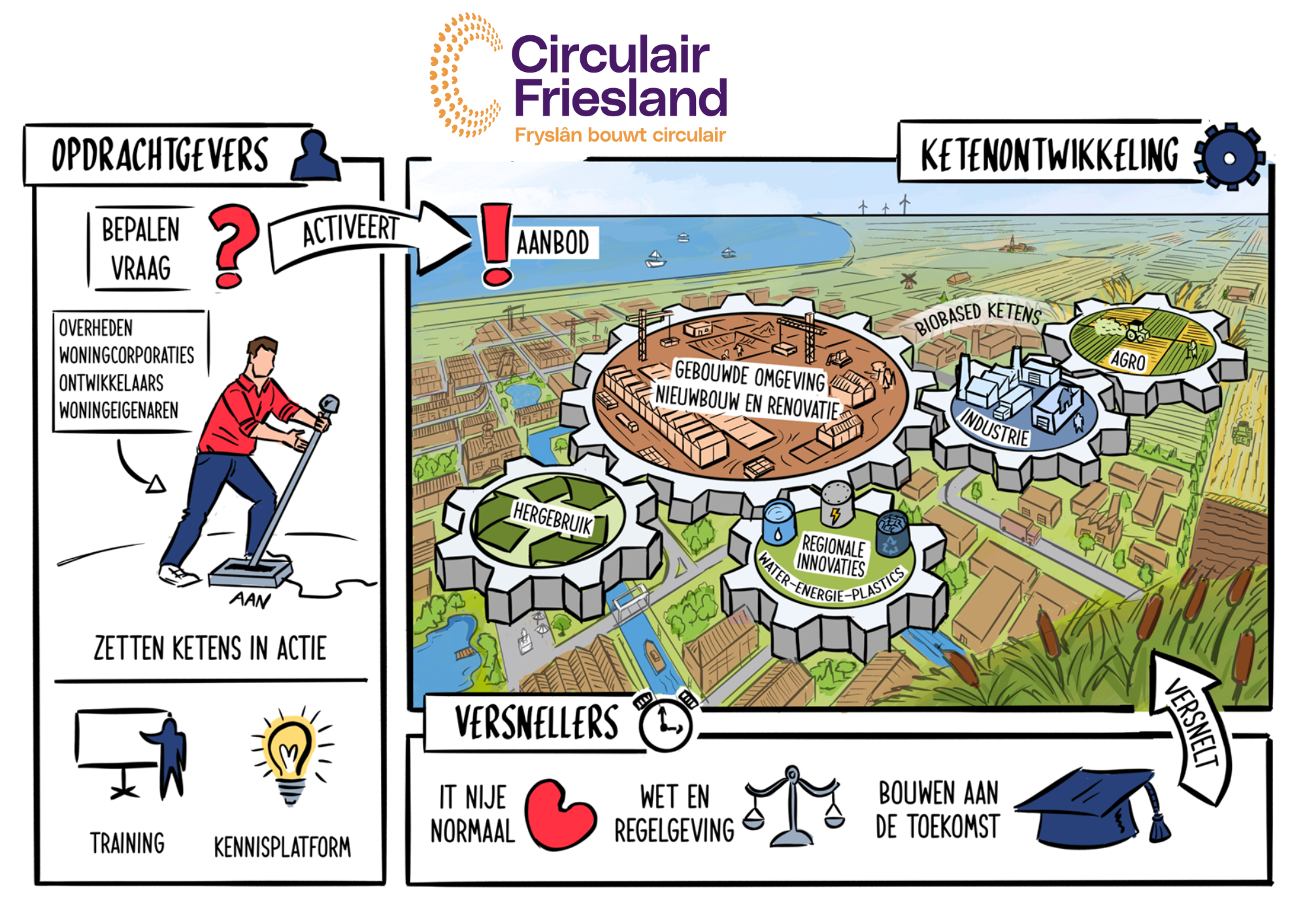
Water¶
Water is central to Friesland’s identity and economy. Shaped by lakes, rivers and coastlines, the region has become a frontrunner in water innovation, earning the title of European Capital of Water Technology. At the heart of this leadership is the ecosystem Watercampus. Consisting of several water technology related organisations, with Wetsus, the leading European research centre of expertise for sustainable water technology, based in Leeuwarden.
Friesland’s innovation ecosystem includes forward-thinking companies such as Hydraloop, which develop smart water reuse systems to reduce household consumption. These solutions are particularly vital as the Netherlands strives to cut daily drinking water use to 100 litres per person by 2035. Moreover, the urban development area Spoordok will be an iconic construction project with 2.000 houses for which the ambition ‘no drop of water will leave the area’ is set.
Friesland actively supports this national goal through initiatives like the Ambition Table for Drinkwater-Saving, a regional collaboration that brings together government, knowledge institutions, and businesses.
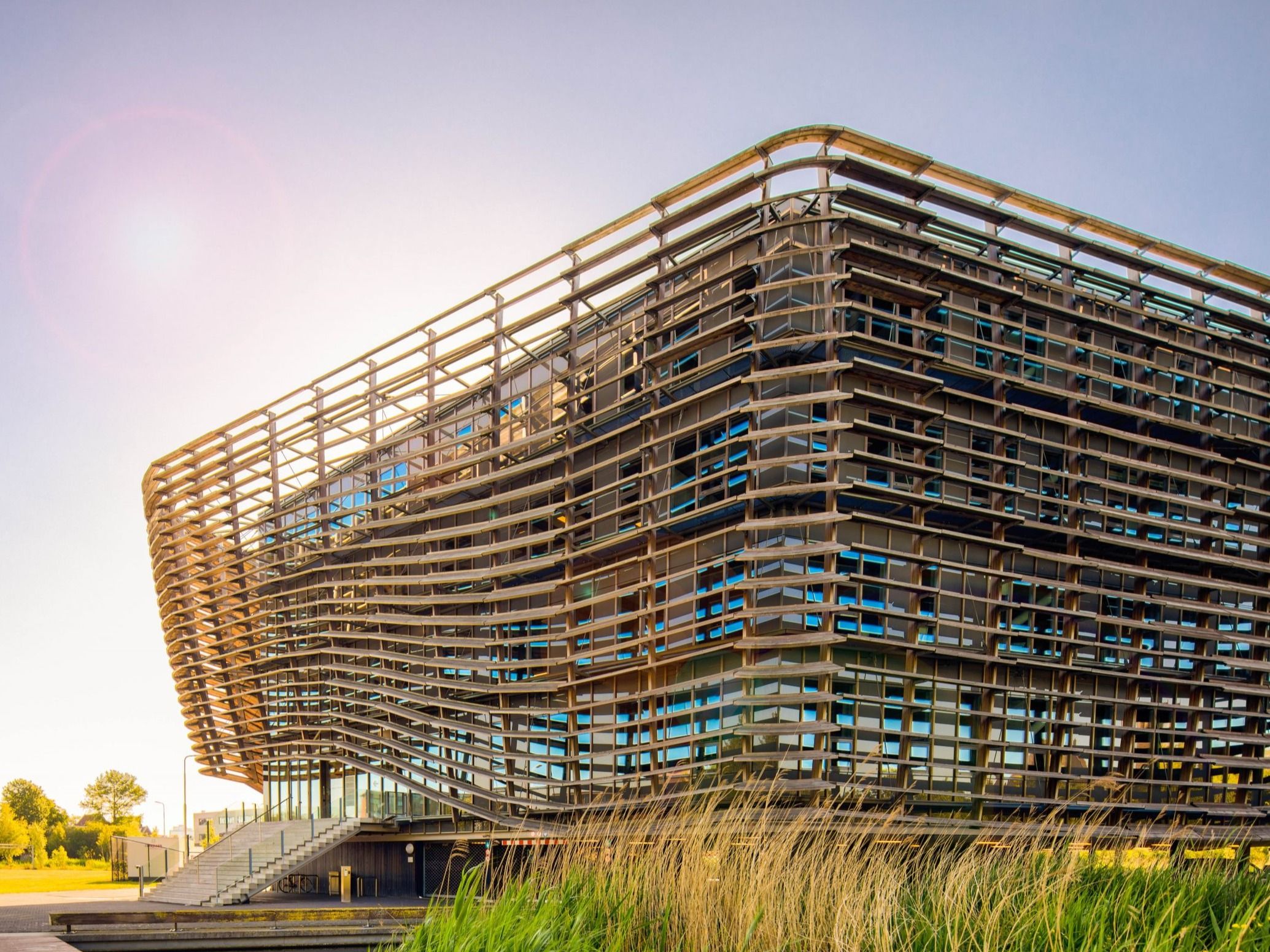

WaterCampus: A Global Hub for Circular Water Technology
WaterCampus drives Friesland’s circular water innovation through trust-based collaboration. Rooted in the region’s deep water heritage, it connects businesses, universities, and governments to turn research into real-world solutions. From nutrient recovery at Spoordok to Hydraloop’s decentralized reuse, WaterCampus makes Friesland a global leader in sustainable water technology.
Read morePlastics¶
Friesland tackles the plastic waste challenge by promoting circular solutions in close collaboration with the other northern provinces of Groningen and Drenthe. Through initiatives like Greenwise Circular Plastics, the north aims to become a leading hub for circular plastics. These efforts bring together the entire plastics value chain—from production to recycling—while driving innovation in design for circularity. Friesland is also home to the National Test Centre for Circular Plastics, further strengthening its role in research and development.
Friesland is also home to the Wadden Sea—the largest tidal system in the world and a dynamic wilderness landscape with high ecological and environmental value. To reduce plastic pollution in this unique area, the extensive cooperation program Wad Gaat Om applies a circular approach focused on reuse, natural materials, and systemic change. Together with entrepreneurs, governments, and educational institutions, efforts are being made to establish a new standard for plastic use and prevention.
In European projects like FrontSH1P and X-Lives, Circulair Friesland collaborates with national and international partners to advance sustainable plastic solutions and build a resilient, resource-efficient economy.
Infrastructure¶
The infrastructure sector has a major material footprint and plays a key role in the transition to a circular economy. Roads, bridges, and other public works require large quantities of raw materials and have long lifespans, making design and procurement decisions particularly impactful. Circular Friesland and its members try to stimulate the use of circular materials in the infrastructure sector through initiatives such as the 2024 asphalt agreement, a collaborative approach of the three northern provinces of Friesland, Groningen and Drenthe to stimulate the production and usage of more sustainable asphalt variants.
Another notable example of how circular infrastructure can contribute to both ecological and societal goals is the iconic Fish Migration River at the Afsluitdijk. This innovative project reconnects the Wadden Sea and the IJsselmeer, enabling migratory fish to move freely between salt and freshwater—a vital condition for their reproduction and survival. By integrating ecological restoration into large-scale infrastructure, the project demonstrates how circular principles can support biodiversity, strengthen water systems, and create added social and recreational value.

Hospitality and tourism¶
The tourism and hospitality sector in Friesland is experiencing rapid growth, contributing significantly to the region’s economy. However, this growth also brings with it a considerable environmental impact. Despite this, the sector holds a unique position—both as a major consumer of circular products and as a potential source of inspiration for visitors. Given its visibility, the sector plays a crucial role in shaping the region’s image and identity.
In response to these challenges, Circular Friesland and its members and regional partners are actively engaged in initiatives designed to promote circularity within the tourism and hospitality sector. Notable projects include “Sleeping in the Future,” participation in the European Interreg project 3ST, and the facilitation of CIRCO courses for key regional stakeholders.
Through collaboration with businesses, government bodies, and educational institutions, Friesland is exploring ways to help the sector transition towards circular practices. This includes identifying and addressing barriers such as conflicting interests, regulatory challenges, and financial constraints, while working together to transform these obstacles into opportunities for a more sustainable and future-oriented tourism industry.
Agrifood¶
Agrifood has long played a central role in Friesland, shaping both the economy and the relationship between city and countryside. As one of the region’s circular clusters, agrifood is part of the broader transition towards a circular economy—focused on closing nutrient loops, improving soil health, and supporting sustainable food systems.
Friesland aims to reduce nutrient leakage in its agri-food system by 2035, in line with the national goal of full circularity by 2050. This transition depends on collaboration between farmers, governments, knowledge institutions, and businesses.
An example of this approach is SNuK (Closing Nutrient Cycles), where partners work together on concrete projects that contribute to a fairer, more resilient agricultural system with a future-proof earning model for farmers. Friesland also contributes toward more futureproof agricultural systems by fostering the cultivation of crops for biobased building materials (in line with the NABB) and through engaging with the national program on regenerative agriculture (ReGeNL).
